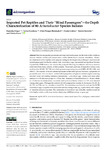2022-04-24Zeitschriftenartikel
Imported Pet Reptiles and Their “Blind Passengers”—In-Depth Characterization of 80 Acinetobacter Species Isolates
Unger, Franziska
Eisenberg, Tobias
Prenger-Berninghoff, Ellen
Leidner, Ursula
Semmler, Torsten
Ewers, Christa
Reptiles are popular pet animals and important food sources, but the trade of this vertebrate class is—besides welfare and conservation—under debate due to zoonotic microbiota. Ninety-two shipments of live reptiles were sampled during border inspections at Europe’s most relevant transshipment point for the live animal trade. Acinetobacter spp. represented one significant fraction of potentially MDR bacteria that were further analyzed following non-selective isolation or selective enrichment from feces, urinate, or skin samples. Taxonomic positions of respective isolates were confirmed by MALDI-TOF MS and whole-genome sequencing analysis (GBDP, dDDH, ANIb, and rMLST). The majority of the 80 isolates represented established species; however, a proportion of potentially novel taxa was found. Antimicrobial properties and genome-resistance gene screening revealed novel and existing resistance mechanisms. Acinetobacter spp. strains were most often resistant to 6–10 substance groups (n = 63) in vitro. Resistance to fluorchinolones (n = 4) and colistin (n = 7), but not to carbapenems, was noted, and novel oxacillinase variants (n = 39) were detected among other genes. Phylogenetic analysis (MLST) assigned few isolates to the known STs (25, 46, 49, 220, and 249) and to a number of novel STs. No correlation was found to indicate that MDR Acinetobacter spp. in reptiles were associated with harvesting mode, e.g., captive-bred, wild-caught, or farmed in natural ecosystems. The community of Acinetobacter spp. in healthy reptiles turned out to be highly variable, with many isolates displaying a MDR phenotype or genotype.
Files in this item

